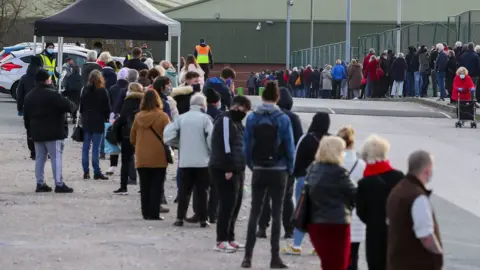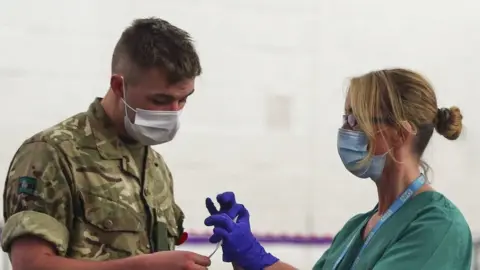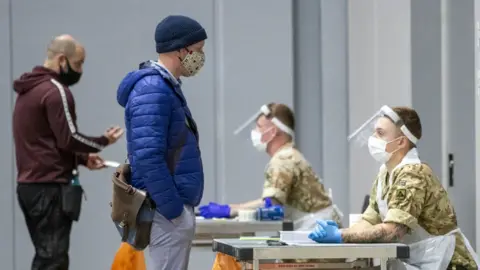Covid: Liverpool testing trial sites doubled after queues on first day
 PA Media
PA MediaThe number of coronavirus testing sites in Liverpool has doubled after "really good interest" in the scheme, its public health director has said.
Matthew Ashton said a total of up to 12,000 people were tested at six centres on Friday as England's first trial of city-wide testing began.
Mr Ashton said a further eight sites were brought in on Saturday.
The city council said it could extend the two-week pilot scheme as more opened.
All residents and workers in Liverpool - the first area to be placed under England's tier three restrictions - have been offered regular tests, regardless of whether they display symptoms.
Officials say this is in a bid to curb the spread of coronavirus.
Healthcare, education and other key workers, along with students, have been particularly encouraged to take a test.
Mr Ashton told BBC Radio 4 Today: "We are still working on the numbers but we think (there were) about 1,500-2,000 people per testing centre.
"So really good numbers and lots of interest, so it was very encouraging.
"For the most part, it ran very smoothly. It was good, it wasn't perfect but we'll improve it".
City mayor Joe Anderson said: "The people of Liverpool did not let us down on the first day and I am delighted that so many people turned out for a test.
"This is a huge logistical exercise the likes of which has not been tried before, and I would like to take this opportunity to thank people for their patience and understanding as I know many had to queue for a while for a test."
Residents are urged to book tests online or by phone, and not to turn up without an appointment.
People with symptoms have been told to not attend the mass testing centres but instead arrange a test at one of the mobile testing units in the city.
Some health experts have criticised the trial, with Allyson Pollock, professor of public health at Newcastle University, warning that plans to test asymptomatic people went against advice from the Scientific Advisory Group for Emergencies (Sage) to prioritise tests for those displaying symptoms.
 PA Media
PA MediaMr Ashton said he thought the nationwide lockdown, which started in England on Thursday, was necessary because tier three rules had not been successful in limiting transmission.
He said the summer exit from the first national lockdown occurred when Liverpool "still had levels of the virus in our community".
"They weren't high but they were still very present and it was higher than other parts of the country, and I think that's what drove the big increases in the north west […] so we were first to have the second wave," he said.
By cutting social contact, he said, the new lockdown measures would "absolutely help" to bring transmission down.
"The big question is will they cut them enough, will it take the levels of the virus low enough?"
As of Friday, 58 deaths were reported in the city during the past week, according to data.
Overall, Liverpool recorded 1,501 coronavirus cases in the seven days to 3 November, compared with 2,074 cases in the previous week.
This means the rate had dropped from 416 per 100,000 people to 301 per 100,000. Across England overall, the rate was 240 per 100,000.
 PA Media
PA Media
- A SIMPLE GUIDE: How do I protect myself?
- IMPACT: What the virus does to the body
- ENDGAME: How do we get out of this mess?
- WITHOUT SYMPTOMS: The mystery of 'silent spreaders'


Why not follow BBC North West on Facebook, Twitter and Instagram? You can also send story ideas to [email protected]
